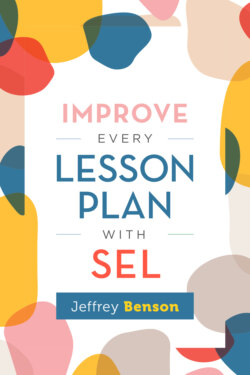Improve Every Lesson Plan with SEL

Реклама. ООО «ЛитРес», ИНН: 7719571260.
Оглавление
Jeffrey Benson. Improve Every Lesson Plan with SEL
Improve Every Lesson Plan with SEL
Table of Contents
Dedication
Acknowledgments
Introduction
Confronting the Lesson Plan "Devil"
Becoming Mainstreamed
Embracing the Neuroscience—Without Adding to Teachers' Workload
Looking Beyond Lesson Plans
Writing About Institutional Racism and Inequity
How This Book Is Organized
A Note About Remote Learning
Making SEL Goals Explicit
How SEL Skills Lead to Mastery
Identifying the SEL Skills You Promote
Essential SEL Skills for All Ages
Figure 1.1. Essential SEL Skills
SWBATs and Racism
Action Steps
The Power of Praise
Action Steps
How SEL Skills Are Implicit in Lessons
Action Step
SEL Skills and the SWBATs
Turn-and-Talks for SWBATs
Steps for a Turn-and-Talk
Teacher Prompts
Making Your Own Goals Explicit
Action Steps
SEL Goals and Academic Achievement
Steps for Supporting Academic Success Through SEL Goals
Teacher Prompts
Questions and Answers
The Start of the Lesson. Gaining Students' Interest and Motivation
Action Steps
Teacher Greetings
Getting Settled
Classroom Jobs
Action Steps
"Do-Now" Meets SEL Skills
Do-Nows, SEL, and Equity
Do-Nows and the SEL Skills of Contributing to the Greater Good
Action Steps
Do-Now Options
Action Steps
Metacognition, Do-Nows, and SEL
Questions and Answers
Accessing Prior Learning
Including All Students
A Big Pitfall
The Best Prompt for Accessing Prior Learning
Another Opportunity to Make SEL Skill Building Explicit and Intentional
Action Steps
Activities for Accessing Prior Learning
Action Steps
Questions and Answers
Providing and Receiving Direct Instruction
Why Direct Instruction Needs SEL
Action Steps
Action Steps
Figure 4.1. Reasons Teachers Can Give for Direct Instruction
Action Steps
The 100 Repetitions
Action Steps
Determining the Frequency of SEL Prompts
Why Lecturing Is Rarely Good Pedagogy
Action Step
Sharing an SEL Lecture Goal
Action Steps
SEL Skills to Summarize Direct Instruction
SEL and Note Taking
Questions and Answers
Action Steps
Time to Experiment and Discover
Enhancing Exploration with Explicit SEL Prompts
Action Steps
SEL Skills and Constructivism
Exploration Example #1: A Trip to Manhattan
Action Steps
Exploration Example #2: "Inventing" a Math Process
Action Steps
Options and Ideas for SEL-Rich Explorations
SEL and the Choice to Work Alone or with Others
SEL and Memorization
SEL and Workstations
SEL and Making Mistakes
SEL in the Content Areas
Questions and Answers
Formative Assessment
Finding the Joy in Formative Assessment
Action Steps
Formative SEL Assessment Throughout the Lesson
Action Steps
SEL, Trust, and Formative Assessment
Action Steps
SEL, Metacognition, and Formative Assessment
Options for SEL and Formative Assessment of Academics
Conferencing
Quick Formative Assessment
Action Steps
Bloom's Taxonomy, SEL, and Formative Assessment
Figure 6.1. Sample Formative Assessment Chart for Quick Check-Ins
Figure 6.2. Active Verbs Based on Bloom's Taxonomy
Action Steps
A Simple Student Self-Assessment Rubric for Formative Assessment
Questions and Answers
Closure of the Lesson
Investing Time in Closure
The Inadequacy of Two Seconds
Action Steps
The Academic Benefits of SEL-Informed Closure
Closure, SEL Skills, and Homework
Action Steps
SEL and the Menu for Closure
Figure 7.1. Prompts for Closure Activities
Figure 7.2. Sample Exit Ticket for Student Reflection
Expressing Gratitude: A Classic SEL Ritual for Closure
Action Steps
Questions and Answers
Epilogue
Appendix. Chapter-by-Chapter Lesson-Planning Guide
References
About the Author
Related ASCD Resources. SEL and Lesson Planning
Print Products
Video
PD Online
ASCD myTeachSource®
Whole Child
Whole Child Tenets
Study Guide
Introduction
Chapter 1. Making SEL Goals Explicit
Chapter 2. The Start of the Lesson: Gaining Students' Interest and Motivation
Chapter 3. Accessing Prior Learning
Chapter 4. Providing and Receiving Direct Instruction
Chapter 5. Time to Experiment and Discover
Chapter 6. Formative Assessment
Chapter 7. Closure of the Lesson
Epilogue